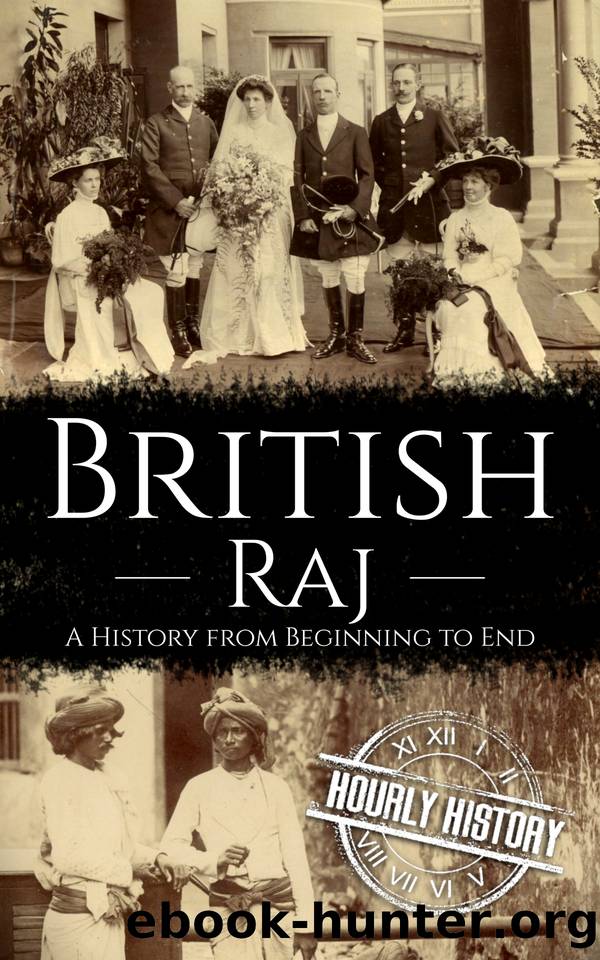British Raj: A History from Beginning to End (History of India) by History Hourly

Author:History, Hourly
Language: eng
Format: epub
Publisher: Hourly History
Published: 2023-03-13T00:00:00+00:00
Chapter Six
Mahatma Gandhi
âWe are our own slaves, not of the British. This should be engraved on our minds. The whites cannot remain if we do not want them. If the idea is to drive them out with firearms, let every Indian consider what precious little profit Europe has found in these.â
âMahatma Gandhi
Mohandas Karamchand Gandhi would become the best-known exponent of Indian independence and one of the most renowned people in the world under the name he was later given: Mahatma (âvenerableâ) Gandhi.
Gandhi was born in October 1869 as a member of a Gujarati Hindu Modh Bania family in the town of Porbandar, then part of the princely state of Porbandar. In 1888, he moved to London, where he studied law at the University of London. He returned to India in 1891 and set up a law practice in Bombay. This venture failed, and in 1893, Gandhi moved with his family to South Africa (then part of the British Empire), where he took a position as a lawyer for a large shipping company. He expected to remain in South Africa for one year. Instead, he spent the next 21 years in that country.
Before his arrival in South Africa, Gandhi seems to have been a supporter of the British Empire, but the racial and religious discrimination he saw there would change his views. He became involved in politics and helped to found the Natal Indian Congress in 1894. Through this organization, he campaigned for the rights of the Indian community in South Africa. He became so successful in this, and so well known, that in 1897 he was attacked by a violent mob of white South Africans. He was saved from injury or even death only by the intervention of the police.
During the Boer War, Gandhi created the Natal Indian Ambulance Corps, a group of Indian volunteers who supported the British Army with medical facilities during that war. Gandhi and 37 other members of the corps received the Queenâs South Africa Medal as a result of their actions. In 1906, however, the Transvaal government (the British administration in South Africa) introduced a new act that required the registration of all Indian and Chinese people in the colony. Gandhi saw this as discrimination and organized protests against the act.
For the first time, these protests involved a new approach devised by Gandhi: Satyagraha. This approach (the name means âholding firmly to truthâ) involved non-violent protest and passive resistance. Gandhi later said of this approach, âTruth (satya) implies love, and firmness (agraha) engenders and therefore serves as a synonym for force. I thus began to call the Indian movement Satyagraha, that is to say, the Force which is born of Truth and Love or non-violence.â
In 1915, Gandhi returned to India, bringing with him the new ideas of Satyagraha. For one year, he did not join any political organization or take part in any political events. Rather, he spent this time traveling across the country, meeting with ordinary Indians and gaining a deep understanding of the situation there.
Download
This site does not store any files on its server. We only index and link to content provided by other sites. Please contact the content providers to delete copyright contents if any and email us, we'll remove relevant links or contents immediately.
| Central Asia | Southeast Asia |
| China | Hong Kong |
| India | Japan |
| Korea | Pakistan |
| Philippines | Russia |
The Sympathizer by Viet Thanh Nguyen(4384)
The Rape of Nanking by Iris Chang(4203)
World without end by Ken Follett(3474)
Ants Among Elephants by Sujatha Gidla(3460)
Blood and Sand by Alex Von Tunzelmann(3195)
Japanese Design by Patricia J. Graham(3165)
The Queen of Nothing by Holly Black(2586)
City of Djinns: a year in Delhi by William Dalrymple(2548)
Foreign Devils on the Silk Road: The Search for the Lost Treasures of Central Asia by Peter Hopkirk(2455)
India's Ancient Past by R.S. Sharma(2450)
Inglorious Empire by Shashi Tharoor(2437)
Tokyo by Rob Goss(2427)
In Order to Live: A North Korean Girl's Journey to Freedom by Yeonmi Park(2378)
Tokyo Geek's Guide: Manga, Anime, Gaming, Cosplay, Toys, Idols & More - The Ultimate Guide to Japan's Otaku Culture by Simone Gianni(2360)
India's biggest cover-up by Dhar Anuj(2350)
The Great Game: On Secret Service in High Asia by Peter Hopkirk(2332)
Goodbye Madame Butterfly(2250)
Batik by Rudolf Smend(2179)
Living Silence in Burma by Christina Fink(2066)
